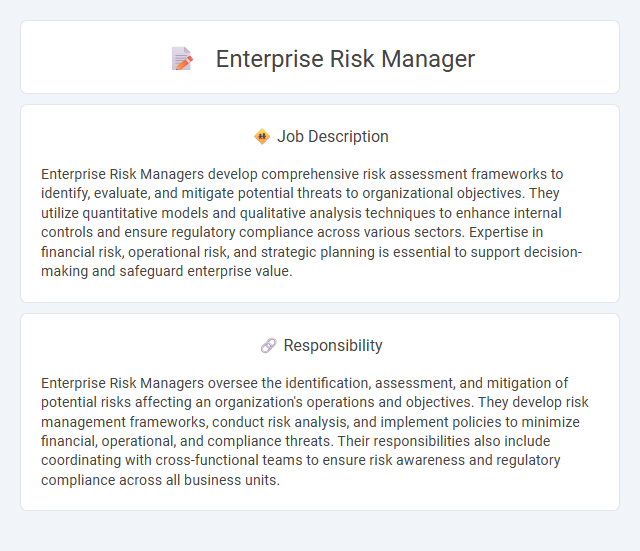
Enterprise Risk Managers develop comprehensive risk assessment frameworks to identify, evaluate, and mitigate potential threats to organizational objectives. They utilize quantitative models and qualitative analysis techniques to enhance internal controls and ensure regulatory compliance across various sectors. Expertise in financial risk, operational risk, and strategic planning is essential to support decision-making and safeguard enterprise value.
Individuals with strong analytical skills and a high tolerance for stress are probably well-suited for the Enterprise Risk Manager role, as it involves assessing and mitigating complex organizational risks. Professionals who can think strategically and communicate effectively with diverse stakeholders will likely thrive in this position. Those who prefer routine tasks and limited decision-making may find the responsibilities challenging and less compatible with their strengths.
Qualification
Enterprise Risk Manager roles demand strong expertise in risk assessment, regulatory compliance, and strategic planning with a minimum of 5-7 years in risk management or related fields. Advanced qualifications often include a Bachelor's or Master's degree in Finance, Business Administration, or Risk Management, supplemented by professional certifications such as Certified Risk Manager (CRM) or Financial Risk Manager (FRM). Proficiency in data analysis tools, risk mitigation techniques, and effective communication skills are critical for evaluating, monitoring, and reporting enterprise-level risks.
Responsibility
Enterprise Risk Managers oversee the identification, assessment, and mitigation of potential risks affecting an organization's operations and objectives. They develop risk management frameworks, conduct risk analysis, and implement policies to minimize financial, operational, and compliance threats. Their responsibilities also include coordinating with cross-functional teams to ensure risk awareness and regulatory compliance across all business units.
Benefit
An Enterprise Risk Manager likely contributes to identifying and mitigating potential risks, which can enhance organizational resilience and reduce financial losses. Their expertise probably supports informed decision-making, leading to improved strategic planning and regulatory compliance. Employing an Enterprise Risk Manager may increase stakeholder confidence by demonstrating proactive risk management practices.
Challenge
Enterprise Risk Manager roles likely involve navigating complex regulatory environments and identifying emerging risks that could impact organizational stability. Managing cross-functional teams and integrating risk strategies across diverse business units may present significant challenges. The dynamic nature of global markets probably requires constant adaptation and proactive risk assessment skills.
Career Advancement
Enterprise Risk Managers play a critical role in identifying, assessing, and mitigating risks across organizational operations, making their expertise highly valuable for strategic decision-making. Career advancement often involves progressing to senior risk management roles, such as Chief Risk Officer or Director of Risk, by demonstrating strong analytical, leadership, and regulatory compliance skills. Professionals who continuously update their knowledge in risk modeling, compliance frameworks, and industry-specific regulations significantly enhance their prospects for promotion and higher compensation.
 kuljobs.com
kuljobs.com